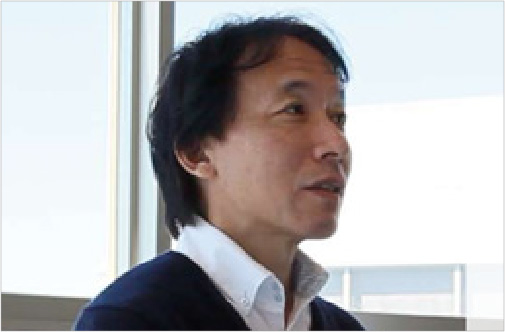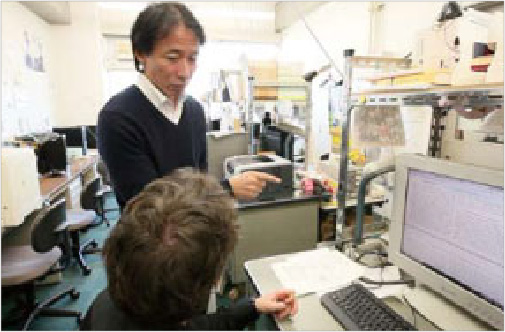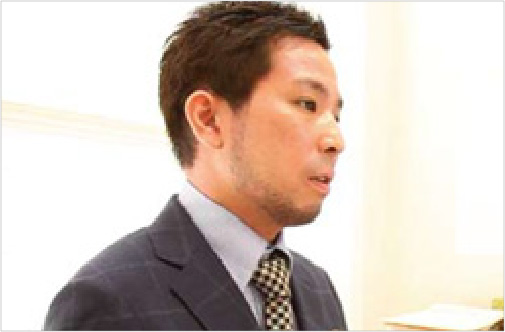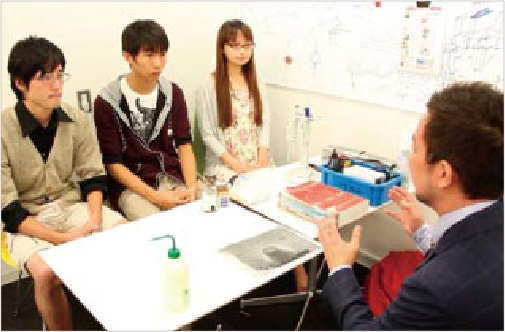
−INTERVIEW−
Faculty talking about SD
Professor Toshiyuki Murakami

It’s more fun to challenge yourself
to do research
on something
you think “it may be impossible.”
ーPlease tell us your expertise.
My expertise is Machine Systems, of which the main focus is control, and making collaborations with humans possible. To give you an example, I am involved in high performance control of wheelchairs and EVs.
ーBy such expertise, what will be made possible?
I think that my expertise will be able to make human motions more reliable and secure safety.
ーHave you been studying about such subject since you were a student?
When I was a student, I did various things. Originally, I was researching wind power generation and wave power generation systems. I was rather researching on energy generation before robot control. Robots are hard to make for practical use, so my current research is to aim for a machine system that is close to humans and useful, thinking about high functionality in machine systems that mainly focuses on control.
ーHave you been interested in such things since you were in high school?
When I was in high school, I was not that interested (lol). My major was Electrical Engineering, so I was rather extremely interested in electrical things.
ーTo your eyes, are there any particular characteristics of people who would be suitable for this Department?
The System Design Engineering Department was established originally with a purpose of designing hardware by expressing an comprehensive engineering system that can accommodate the rapidly changing world in terms of socially and environmentally. This Department is rather an academic system that has never existed before. For this reason, this Department may be suitable for those who want to be a researcher or a developer who wants to challenge himself/herself in developing a new field.
ーI have heard that students in the System Design Engineering Department communicate very often with students in other majors. Does the same applies to professors?
It is often difficult among different majors, but the faculties in System Design Engineering Department have various majors. For this reason, it is easy to cooperate within the Department, and as a result, a cooperation among different majors can be possible. In a way, the Department offers an extremely free atmosphere, so it is extremely easy to cooperate among the faculties.
ーWere there any benefits that have resulted from such cooperation?
Yes, in my field, we focus on control to increase the performance. Lately, we have been thinking about a control through network. In order to make it possible, it would be difficult to do so without the help of the Information Technology field. So, there is a case that Professors from the Information field and the Control field to work on a highly accurate control through network.

ーIs it like, for instance, you have a robot to read a map and travel back and forth as it reads the map?
That is an example. Other than that, for example, when I thought about a nursing robot, technology-wise, it is difficult to have a robot to do all the actual nursing work, but by operating remotely, it can be done relatively safely. If nursing is done remotely, information technology is necessary, meaning that the network is necessary. In nursing, important points such as control and information are expected to have safety and reliability. These points can be covered by cooperating among the faculties.
ーWhile you are conducting research like you have just mentioned, what would be the one moment that made you feel the most satisfied.
That is what I thought, “it doesn’t seem possible”, became possible. I should not say this, but recent research is done after making a prediction to make sure that the research will most likely be a success. That research may get results, but I would not find it interesting. I am most satisfied and happy at the moment when my research is a success and when I challenge myself to do research that I thought I would not be able to make successful.
ーHow would you describe what System Design Engineering is in 1 word?
1 word… This Department is a department that is hard to describe in 1 word (lol). If I have to describe it, it is a department that offers a wide variety of fields, which are challenging and focus on various applications of engineering.
ーAny advice to high school students who want to enroll in System Design Engineering Department?
These days, the world has become extremely complicated/fast-paced, so when you develop a certain technology, you have to take environment and society into account, which makes it very difficult. In this world, when you think about utilizing engineering-like products, you need a wide variety of knowledge, meaning there will be more studying you need to do. For this reason, the System Design Engineering Department allows to gain a wide variety of basic knowledge and study to think sharp and have your basis. Have various interests, study and aim for entering a college.
Professor Yoshihiro Taguchi

To the world, I want to create new values.
ーPlease tell me about your expertise.
I am working on developing a totally new sensor using optics.
ーWhat does the development make possible?
The development will makes it possible to detect temperatures in higher accuracy and monitor them. To give you an example, a CPU that is installed in a personal computer gets extremely hot while in use, and this may break or may cause a phenomena such as overheating. If the inside temperature can be measured, it will be possible to control the heat generation of the device, which makes it possible to develop the next generation device.
ーI have heard that such research is applied to the Biology field.
Yes, diseases change proteins in their structures, and what I am working on to measure such structural changes by using optics. Sensors are equipped with an extremely small chip, so if they can be loaded in watches, the structural changes in proteins can be detected so that health conditions can be detected immediately anywhere and anytime.
ーHave you been doing such research since when you were student?
When I was a student, I performed research on measuring temperature and physical property by using a laser. After graduation, I performed research on the next generation endoscope at Stanford University in the U.S for about 2 years. There, I was involved in a development of sensors that are embedded in an endoscope to detect cancer cells.
ーWere you always interested in the world of Nano before entering college?
To tell you the truth, I had been interested in outer space since I was in junior high school, so I wanted to study the field. After entering Keio University, I was assigned to a laboratory that studies the Nano field. In the beginning, I thought, “oh, it’s not outer space” (lol), but I found the field extremely interesting. I thought that nanotech is a field that will expand in the future, and from there, I got into it and here I am.
ーAre there differences between other Science and Engineering Department and System Design Engineering Department?
For every department, the purpose of academics, “top of the mountain” so to speak, is the same, but the ways of climbing the mountain are different. For example, a department of that academic system is very technical, basics are well-learned while climbing to the top. On the other hand, the System Design Engineering Department aims to the top by systemizing and “merging” the 5 fields: energy environment, mechanics, manufacturing, control and electronics. In order to resolve the current problems in the society, the complex academic system is required so this type of characteristics is often helpful.

ーI have heard that this subject is comprehensive. Are there is a lot of communication among professors and students?
Yes, there is a lot of communication. For instance, we have a training camp with other laboratories. Also, we do what is called, an “overseas field training” in which we go to an overseas training facility with other laboratories and have discussions and workshops with local researchers. The students in this department actively go outside and work together.
ーEveryone actively mingles with one another. Do you invite students to the laboratory?
Yes, students of other Laboratories visit our Laboratory. As well, our Laboratory has an open house and a presentation with another Laboratory of the same nanotech field. By doing so, we get to know one another’s fields and are inspired to make new projects. For example, it may be possible for faculties in the Architectural field and who perform research on brain waves to work together and create a landscape with a new architecture and a design of a town. For this reason, we do various joint research.
ーWhat are the students and the campus like?
There are many students who are good at turning on and off their switch. In the laboratory, they deliberately focus on their research. On the other hand, once they are off the campus to take a break, they can turn off their switches and deliberately enjoy their time off. For this reason, they are not uptight on campus and rather careful and lively.
ーWhat made you want to be the faculty?
Currently, there are less laboratories in Japanese corporations and it resulted in losing an opportunity to do basic research. For this reason, colleges play a bigger role in accepting many students to carry out basic research. By being a professor myself, in addition to pursue my own studies, I would like to train students who will lead the future and present new values from Japan to the world.
ーCurrently, what do you enjoy the most as a professor?
That is when students feel that, “it’s fun!” In Keio University, there is a saying, “Hanji Hansu (Learn half, teach half)” by Professor Yukichi Fukuzawa. It means the spirit of teachers and students teach one another and learn from one another. It also means that professors are to teach their students, and on the other hand, students are also to teach in a certain aspect. For this reason, I also learn from my students. I truly enjoy when we give ideas to one another, enjoying overcoming challenges and the students’ eyes have a sparkle in their eyes.
ーFor Mr. Taguchi, what does System Design Engineering mean to you?
That’s a difficult question (lol). I have a strong desire to continue sending out new technologies from Japan to the world. The System Design Engineering Department has students being full of energy, and what they learn immediately produces new values. For this reason, for me, here is my life and the place to produce new values.
ーAny advice to high school students who want to enroll in System Design Engineering Department?
In the System Design Engineering Department, students break down the conventional academic systems that is divided vertically and, under the curriculum that accommodates the current needs, study/research every day. It is not easy to create new values, but the characteristics of the System Design Engineering Department, which offers the leading integrated fields to accommodate the current needs and allows to learn about the 5 fields inter-disciplinarily that are essential to resolve challenges. I would like to create values to the world with people who are highly motivated and have a wide range of view.


